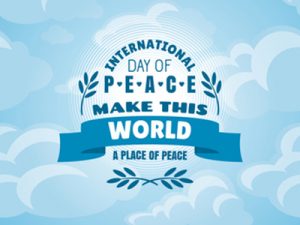Spirited Reflection: Peacebuilding, an ever present opportunity

Peace is often misunderstood as an absence, a state of tranquil stillness where nothing is happening, there’s no conflict or change. The world we live in isn’t like that, and seeking to enforce an ideal onto the world can itself be a form of violence, called negative peace. The quintessential image of this is a dictatorship where people are afraid to voice their concerns, so there may appear to be no conflict. Lying just below the surface are unmet needs that continue to fester. Positive peace is peace grounded in good relationships, truth, and justice. It is actually a continual process, not a static hiding place.
This can start inside us and move outward into the world, and it can start outside with peaceful and just political structures, peace education, and witnessing and taking into ourselves peaceful ways of relating to each other.
Conflict is healthy; we just need the skills to keep it constructive. When in conflicts that are turning hateful or violent, we can look to a process of opposing unjust and harmful actions while continuing to create relationships, remaining genuinely curious about others we’re in conflict with, never shutting them out. Speaking to the Light in all who would be called to violence, we may invite them again and again into the recognition of their own Light and that of others. Until we have the spiritual experience of our connectedness, it may be difficult for us, whether as individuals or nations, to honestly explore ways that conflicts can be transformed using powers other than violence. We may just shrug off non-military or nonviolent options as wishful thinking.
Understanding the challenge of peace from the Society of Friends’ perspective~
“Despite the fact that the Society of Friends developed in an age of violent revolution and has had a witness against war for all of its history, the origin of the peace witness did not start with a concern about war. The Quaker witness developed from a deep faith in the essential unity of mankind and the sacredness of each individual because of that ‘of God’ or the ‘Inward Light’ in each person comprising that unity.”
Lawrence Scott, 1965, Canadian Yearly Meeting Faith and Practice, 4.23
The Religious Society of Friends (Quakers) is considered an historic peace church, together with Mennonites and the Church of the Brethren. One might think that with this long history of peace theology, and with peace as a core testimony most Friends feel led to live out in the world, Quakers would find peace and pacifism simple. Yet it is anything but! In fact, I would agree with those who say that if you find peace easy or straightforward, you’re not fully engaging with it.
Faith and Practice, a book written by Friends to offer wisdom and guidance for reflection and action, explains well the challenge of peace, since violence is so pervasive in our world and in ourselves:
“We are responsible for what we eat, wear and use. To paraphrase [18th century Quaker] John Woolman: Let us be open to discern how the seeds of destruction of our planet are present in our ways of living. We are thankful that so much joy and beauty has been offered to us.”
Canadian Yearly Meeting Faith and Practice, Canadian Yearly Meeting, p. 139
The peace and justice agency of Quakers in Canada, CFSC, is currently developing workshops and a book on peace skills, bringing together a range of interesting research and stories that show how, even in dire circumstances, there are creative options to build peace, if we are brave enough to seek them.
International Day for Peace is Sept 21.
Matthew Legge is serving as the Peace Program Coordinator, Canadian Friends Service Committee (CFSC) in Toronto since 2013. He is currently researching these peacebuilding options to produce the forthcoming book.




